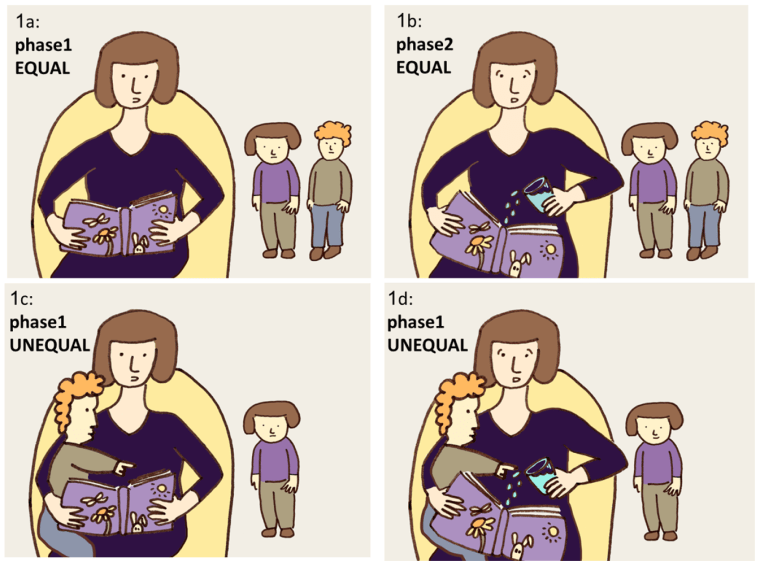You know that happy feeling you have when Justin Bieber gets arrested again? Schadenfreude, or joy over another’s misfortune, isn't just for grown-ups. That complicated emotion starts much earlier than expected, when we're barely old enough to point and say, "Ha, Ha!" Children as young as 2 experience a type of schadenfreude, a new study finds.
Researchers from the University of Haifa in Israel looked at how 35 mothers interacted with their children and another child. Specifically, a mom either read aloud to herself while her child played with a friend or mom read a book out loud, while cuddling the child’s friend. In either situation, the mom was instructed to spill water on the book after two minutes.
When the water spilled on the book while the mother was reading it to the child's peer, her own child became happy. But, the authors make an important distinction—the toddlers aren’t laughing at someone’s terrible misfortune, rather they are happy when what is perceived as an unequal situation ends.
“If this says anything about kids, [it says] they are very practical, self-focused individuals,” says Dr. Deborah Gilboa, a parenting expert, who was not involved with the study.

Gilboa says the study comes to two conclusions as to why this might happen. Children are sensitive to unfair situations and when the unfair situation ends, they’re happy. And, they realize that resources are tight and they fear they won’t get their share of them. In this case, they believe mom only has enough attention for one child.
Children with low self-esteem may feel it more, but the scientists say more research is needed.
It's the latest research looking at the emotional and inner moral life of itty bitty kids. For example, babies can show sympathy before their first birthday. Yale psychology professor Paul Bloom has studied the sense of right and wrong in babies, saying toddlers will spontaneously help an adult in trouble. But in Bloom's book "Just Babies: The Origins of Good and Evil," he also famously writes: "Families survive the Terrible Twos because toddlers aren’t strong enough to kill with their hands and aren’t capable of using lethal weapons. A 2-year-old with the physical capacities of an adult would be terrifying."
Jealousy is a normal emotion and it’s a parent’s job to help their young children navigate it, says Michele Borba, a TODAY contributor.
“Help your child slowly along the way to manage feelings to be able to relate to the real world,” she says.
Gilboa says managing jealousy, while appealing to a child’s sense of fairness, can be tough. When one of her sons was still an infant, she was always telling the older ones to wait. Wait until I finish feeding him. Wait until I am done changing him. So when she helped one of the older children, she’d tell the infant he had to wait. Even if he was asleep the older children didn’t notice and felt as if everything was fair.
The study doesn’t show that children are laughing at other’s pain, but rather that they are judging how fair something is.
“This teaches us for even very young children, they are always judging the fairness of the situation. That doesn’t mean we have to measure it [with] the same yardstick as they do, but we should be talking to them,” says Gilboa.